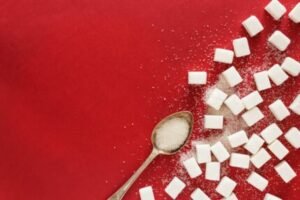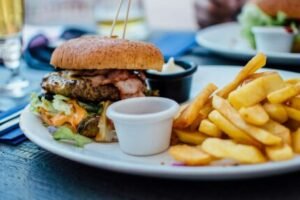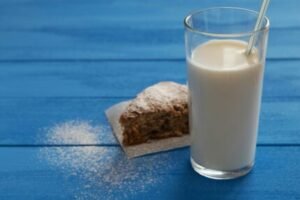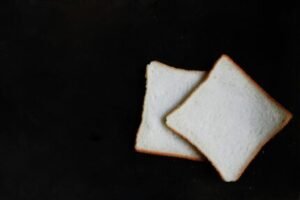Medically reviewed by Dr. Ramesh Gaddam, M.D. — Written by Sumalatha, D.N.H.E
Table of Contents
ToggleA healthy diet plays a big role in clear and glowing skin. What you eat can affect your skin’s appearance, making it oily, dry, or prone to breakouts.
Certain foods can cause inflammation, dehydration, or increase oil production, which may lead to skin problems like acne or wrinkles.
In this guide, we will explore common foods that may harm your skin and explain why avoiding them can help you achieve a healthier, glowing complexion.
1. Alcohol
Alcohol can leave your skin feeling dry and rough by dehydrating your body.
When your skin lacks moisture, it becomes less radiant and may look dull.
Alcohol also speeds up the aging process, leading to wrinkles and fine lines over time.
It can trigger inflammation, making skin conditions like acne or rosacea worse.
To keep your skin glowing and youthful, it’s important to limit alcohol consumption and drink plenty of water to stay hydrated.
2. Dairy Products
Dairy products, such as milk, cheese, and butter, may contribute to acne due to the hormones they contain.
These hormones can increase oil production, which clogs pores and leads to breakouts.
Many people notice clearer skin when they reduce their dairy intake.
If you think dairy affects your skin, try switching to alternatives like almond milk, soy milk, or coconut yogurt.
Keeping track of your diet can help you spot any links between dairy and skin issues.
3. High-Glycemic Foods
Foods like white bread, pastries, and sugary cereals can cause your blood sugar levels to spike.
These high-glycemic foods lead to increased insulin production, which can boost oil production and trigger acne.
Over time, they may also cause skin inflammation, making your complexion less clear.
To support healthy skin, try choosing lower-glycemic options like whole grains, oats, and quinoa.
These foods help keep your blood sugar steady and reduce the chances of breakouts.
4. Sugary Foods and Sweets

Too much sugar can negatively impact your skin, leading to acne and dullness.
Sugary foods like candies, desserts, and sweetened drinks cause your blood sugar to rise quickly, which can trigger oil production and clog pores.
Over time, this can lead to frequent breakouts and less radiant skin.
Limiting your intake of sugary treats and replacing them with natural sugars from fruits can help keep your skin clear and glowing.
Moderation is key to maintaining healthy skin.
5. Processed and Fast Foods
Processed and fast foods, like chips, fried meals, and frozen dinners, are high in unhealthy fats, sugars, and preservatives that can harm your skin.
These ingredients can cause inflammation, which may lead to acne, redness, and other skin issues.
Eating too much of these foods over time can make your skin look dull and tired.
Opting for fresh, whole foods like fruits, vegetables, and lean proteins can help improve skin clarity and keep it looking vibrant.
6. Caffeine (Coffee)
Drinking too much coffee can make your skin look dull and tired.
Caffeine dehydrates the skin, which can lead to dryness and early signs of aging, like wrinkles.
It can also reduce skin thickness, making your skin less firm over time.
If you’re a coffee lover, try to limit your intake and balance it with plenty of water.
You can also explore alternatives like herbal teas to stay hydrated and keep your skin glowing.
7. Chips and Salty Snacks

Salty snacks like chips can cause your skin to look puffy and inflamed.
The high salt content in these foods leads to water retention, which makes your face appear bloated and less radiant.
Over time, too much salt can also dry out your skin, leading to a dull appearance.
Instead of reaching for salty snacks, consider healthier options like unsalted nuts, fresh veggies, or fruits.
These alternatives can help maintain your skin’s natural glow without the negative effects of excess salt.
1. Consume Antioxidant-Rich Foods
Eating plenty of fruits and vegetables is essential for glowing skin.
Foods rich in antioxidants help protect your skin from damage caused by harmful substances.
Berries, leafy greens, and citrus fruits are excellent choices.
These foods not only provide vitamins and minerals but also help fight inflammation, giving your skin a brighter appearance.
2. Include Healthy Fats
Healthy fats are important for keeping your skin hydrated and supple.
Omega-3 fatty acids, found in fatty fish like salmon, avocados, and nuts, help maintain the skin’s natural moisture barrier.
Including these foods in your diet can improve skin texture and reduce dryness, promoting a healthy glow.
3. Stay Hydrated
Drinking enough water is crucial for skin health.
Hydration helps maintain skin elasticity and aids in detoxification, keeping your skin looking fresh.
Aim for 6-8 glasses of water daily to support your skin’s needs.
You can also consume water-rich foods like cucumbers and watermelon to boost hydration.
4. Limit Processed Foods and Sugars
Processed foods and refined sugars can harm your skin.
They may lead to inflammation, breakouts, and a dull complexion.
Try to limit your intake of sugary snacks, soft drinks, and fast foods.
Instead, focus on whole foods, such as fruits, vegetables, and whole grains, which nourish your skin and support overall health.
Essential Nutrients for Skin Health
Vitamins and Minerals
Key vitamins and minerals are vital for maintaining healthy skin.
- Vitamin C is important for collagen production, which keeps your skin firm and smooth. You can find it in fruits like oranges, strawberries, and kiwi.
- Vitamin E helps protect your skin from damage caused by free radicals, which can lead to aging. Nuts, seeds, and spinach are great sources of this nutrient.
- Selenium supports skin elasticity and repair. You can get selenium from foods like Brazil nuts, eggs, and seafood.
Probiotics for Gut Health
A healthy gut can lead to better skin. Probiotics help balance the bacteria in your digestive system, which can improve skin appearance.
Foods like yogurt, kefir, and fermented vegetables are rich in probiotics.
Including these in your diet can help reduce issues like acne and promote a clearer complexion.
Importance of Hydration
Staying hydrated is not only crucial for your overall health but also for nutrient absorption.
Drinking enough water helps your body use the vitamins and minerals you consume.
Proper hydration contributes to plump, glowing skin and helps flush out toxins, keeping your skin looking fresh and vibrant.
Lifestyle Practices for Radiant Skin
To achieve radiant skin, certain lifestyle practices can make a big difference.
First, prioritizing quality sleep is essential.
During sleep, your body repairs and regenerates skin cells, so aim for 7-9 hours of restful sleep each night.
This helps your skin look fresh and reduces dark circles.
Managing stress is also important, as high stress levels can lead to skin issues like acne or eczema. Try techniques like mindfulness, exercise, or deep breathing to keep stress in check.
Lastly, protecting your skin from the sun is crucial. Regularly using sunscreen with at least SPF 30 can prevent sun damage and early aging.
Make it a habit to apply sunscreen every day, even on cloudy days, to maintain healthy, glowing skin.
Skincare Routine to Enhance Glow
A good skincare routine can greatly enhance your skin’s glow.
- Start with regular cleansing to remove dirt and impurities.
- Use a gentle cleanser that suits your skin type, washing your face twice a day to keep it fresh.
- Exfoliation is also important for skin renewal.
- Gently exfoliating once or twice a week helps remove dead skin cells and promotes a smoother texture.
- Look for mild exfoliants that won’t irritate your skin.
Moisturizing is key to maintaining hydration. Choose a moisturizer that fits your skin type—whether it’s oily, dry, or combination.
Keeping your skin hydrated helps it look plump and healthy.
Finally, consider using products with natural ingredients. They can be less irritating and more beneficial for your skin.
Look for items with ingredients like aloe vera, chamomile, or hyaluronic acid, which can enhance your skin’s glow and overall health.
Conclusion
To achieve glowing skin, it’s important to pay attention to both what you eat and how you care for your skin.
Avoiding foods like alcohol, dairy, sugary snacks, and processed items can help prevent breakouts and dryness, leading to clearer skin.
At the same time, eating more fruits, vegetables, and healthy fats can nourish your skin from within.
Practicing good habits like getting enough sleep, managing stress, and following a simple skincare routine will also help your skin look its best.
By combining these tips, you can enjoy a vibrant and healthy complexion.
Frequently Asked Questions (FAQs)
Which Foods Make Your Skin Glow?
Foods rich in vitamins and antioxidants, like berries, leafy greens, and nuts, can help your skin look radiant. Healthy fats from avocados and fatty fish also support hydration and glow.
What Food Should I Avoid to Lighten Skin?
To lighten your skin, it’s best to avoid foods high in sugar and processed items. These can lead to inflammation and dark spots, making your skin look dull.
What Foods Should I Avoid to Clear Skin?
Avoiding dairy, fried foods, and sugary snacks can help keep your skin clear. These foods can cause breakouts and make skin issues worse.
Which Fruit Is No. 1 for Glowing Skin?
Papaya is often considered one of the best fruits for glowing skin. It’s packed with vitamins and antioxidants that promote a healthy complexion.
What to Eat for Skin Whitening?
Foods rich in vitamin C, like oranges and strawberries, can help brighten your skin. Incorporating more fruits and vegetables into your diet is beneficial for skin tone.
How to Get Clear Skin?
To achieve clear skin, focus on eating a balanced diet, staying hydrated, and following a regular skincare routine.
Avoiding stress and getting enough sleep are also important.
How Can I Glow in 7 Days?
To see a glow in just seven days, drink plenty of water, eat a diet rich in fruits and vegetables, and get enough sleep. A good skincare routine will also help.
Is Rice Water Good for Skin?
Yes, rice water can be good for your skin. It may help brighten your complexion and improve texture when used as a toner or wash.
How to Clear Skin Overnight?
For quick results, cleanse your face before bed, apply a gentle spot treatment for any blemishes, and use a good moisturizer.
Sleep well to help your skin recover.
How to Get Poreless Skin?
To achieve poreless skin, keep your skin clean and exfoliate regularly. Using a clay mask can also help draw out impurities and tighten pores.
How to Get Korean Glass Skin?
Korean glass skin is achieved through a good skincare routine that includes cleansing, hydrating, and moisturizing.
Using products with ingredients like hyaluronic acid can help create that dewy look.
Does Sleeping Give Clear Skin?
Yes, sleep is essential for clear skin. While you sleep, your body repairs and regenerates skin cells, helping to keep your complexion healthy.
Is 5 Hours of Sleep Enough?
Five hours of sleep is generally not enough for most people. Aim for 7-9 hours for optimal skin health and overall well-being.
How to Get Fair Skin?
To promote a fairer skin tone, focus on sun protection, eat a balanced diet rich in vitamins, and stay hydrated. Avoiding excessive sun exposure is key.
How Many Hours Is Beauty Sleep?
Beauty sleep typically refers to getting 7-9 hours of restful sleep each night to allow your skin to recover and regenerate.
What to Apply on Face Before Sleeping?
Before bed, apply a gentle moisturizer to hydrate your skin. You can also use a night cream or serum with beneficial ingredients like retinol or hyaluronic acid.
Does Oversleeping Affect Your Skin?
Yes, oversleeping can sometimes lead to dull skin or breakouts. Maintaining a regular sleep schedule is best for skin health.
Which Foods to Avoid for Clear Skin?
To achieve clear skin, it’s essential to avoid foods high in sugar, dairy, and processed items.
These types of foods can cause inflammation and lead to breakouts, making it harder to maintain a clear complexion.
What Foods Can Help Clear Skin Overnight?
While no food can clear skin overnight, staying hydrated and avoiding salty or sugary snacks before bed can help reduce puffiness and improve skin appearance by morning.
Drinking plenty of water and opting for lighter snacks can make a difference.
What Is the Best Diet for Clear Skin in a Week?
For clearer skin in a week, focus on eating whole foods like fruits, vegetables, lean proteins, and healthy fats.
Incorporating these foods into your meals while drinking plenty of water and avoiding sugary and greasy options can significantly enhance your skin’s clarity.
What Are the 5 Worst Foods for Your Skin?
The five worst foods for your skin include sugary snacks, which can lead to breakouts;
fried foods, known to cause inflammation; dairy products, which may trigger acne for some people;
processed foods that are high in unhealthy fats and sugars; and alcohol, which can dehydrate and dull the skin.
Which Foods Are Worst for Skin Aging?
Certain foods can accelerate skin aging, including sugary foods that cause skin to lose elasticity,
refined carbohydrates like white bread and pastries, processed meats that contain preservatives harmful to skin,
excessive salt leading to water retention and puffiness, and
fried foods that create free radicals damaging to skin health.
What Diet Promotes Glowing Skin in 3 Days?
For glowing skin in three days, focus on consuming fruits like berries and citrus for vitamin C, vegetables—especially leafy greens—for antioxidants, and healthy fats from avocados and nuts.
Staying hydrated by drinking plenty of water throughout the day is also crucial for achieving that radiant glow.
Which Foods Should You Avoid for Skin Acne?
To keep acne at bay, it’s best to avoid dairy, which can trigger breakouts in some individuals;
sugary snacks that increase inflammation;
fast food high in unhealthy fats;
white bread and pasta that can spike blood sugar; and
chocolate, which some studies suggest may worsen acne.
What Are the Best Foods for Skin Repair?
For skin repair, consider incorporating fatty fish rich in omega-3s for hydration, berries high in antioxidants, nuts and seeds that provide healthy fats and vitamins, sweet potatoes packed with beta-carotene, and green tea, which contains compounds that promote skin health.
References
[1] https://www.medicalnewstoday.com/articles/how-to-get-glowing-skin
[2] https://www.prescriptiondoctor.com/blog/10-foods-you-should-avoid-if-you-want-clear-skin
[3] https://www.medicalnewstoday.com/articles/foods-to-avoid-for-clear-skin
[4] https://setu.in/blogs/listing/foods-you-must-avoid-to-get-glowing-skin
[5] https://www.simpleskincare.in/blogs/tips/foods-for-glowing-skin
Also Read:
Arugula: 7 Amazing Health Benefits (Heart, Skin, and More)
10 Surprising Health Benefits of Kalawalla Root (Skin, Men)
11 Health Benefits of Custard Apple (Men, Women, Skin, Hair)
Medically reviewed by Dr. Ramesh Gaddam, M.D.

General Physician, Diabetologist, and Critical Care Specialist.
Related
Discover more from Health Build-Up
Subscribe to get the latest posts sent to your email.







Pingback: Popping Blackheads : Tips, Techniques, & FAQs for Clear Skin